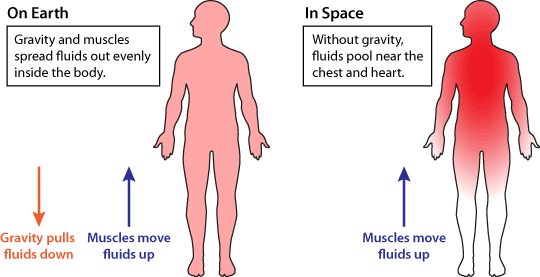Frenzied Fluids
Space may sound glamorous, but living in space changes the way you look, and in space you should never stray too far from a bathroom. Gravity affects water and lymph, fluids found in our bodies. Lymph helps our bodies fight against sicknesses like the cold or flu and other infections.

On Earth, fluids are being pulled down by gravity, and our muscle movement helps to move them back up. In space, because body fluids aren’t pulled down by gravity, they collect around the chest and head.
The upper body swells, and astronauts get what’s called “puffy face.” Because fluids don’t move around the body as well as when on Earth, these pools of fluid fool the body, making it think it is carrying too much water. This makes the astronauts have to pee a lot. In space, astronauts pee more and drink less, so they can become dehydrated very easily.
Read more about: Spaced Out Physiology
Bibliographic details:
- Article: Frenzied Fluids
- Author(s): Dr. Biology
- Publisher: Arizona State University School of Life Sciences Ask A Biologist
- Site name: ASU - Ask A Biologist
- Date published:
- Date accessed:
- Link: https://askabiologist.asu.edu/frenzied-fluids
APA Style
Dr. Biology. (). Frenzied Fluids. ASU - Ask A Biologist. Retrieved from https://askabiologist.asu.edu/frenzied-fluids
Chicago Manual of Style
Dr. Biology. "Frenzied Fluids". ASU - Ask A Biologist. . https://askabiologist.asu.edu/frenzied-fluids
Dr. Biology. "Frenzied Fluids". ASU - Ask A Biologist. . ASU - Ask A Biologist, Web. https://askabiologist.asu.edu/frenzied-fluids
MLA 2017 Style

In space, it is easy to become dehydrated. Here astronauts show off special drink containers.
Be Part of
Ask A Biologist
By volunteering, or simply sending us feedback on the site. Scientists, teachers, writers, illustrators, and translators are all important to the program. If you are interested in helping with the website we have a Volunteers page to get the process started.

